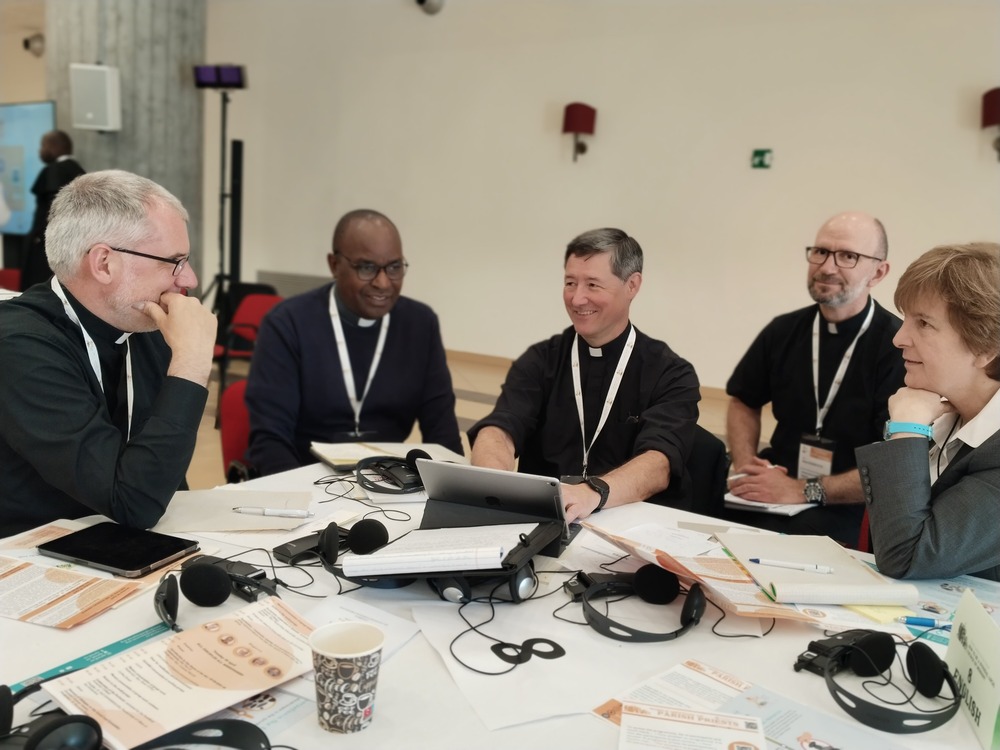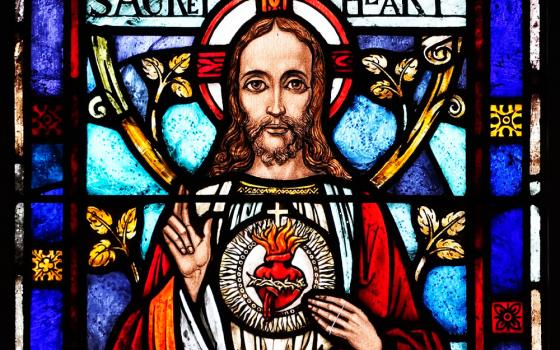
Priests work in an English-language small group April 30, 2024, with facilitator Sister Maria Cimperman, a Religious of the Sacred Heart of Jesus, as part of a meeting of parish priests from around the world gathered at Sacrofano, outside of Rome, to share their experiences and contribute to the ongoing synod on synodality. (CNS/Courtesy of the Synod of Bishops)
The collaboration of laity and priests in the life of a parish and in outreach to the surrounding community "is not a strategy," but the result of taking the sacraments of baptism and confirmation seriously rather than allowing it to remain "a beautiful principle, a virtuous and pious intention," a Canadian theologian told hundreds of pastors.
"It must become effective," Father Gilles Routhier, a theologian and superior general of the Seminary of Quebec, told parish priests participating in a consultation for the Synod of Bishops on Synodality.
In his presentation to the priests April 30, Routhier said that while the Second Vatican Council did not issue a document specifically on parishes, its 1965 Decree on the Apostolate of the Laity said, "The parish offers an obvious example of the apostolate on the community level inasmuch as it brings together the many human differences within its boundaries and merges them into the universality of the Church."
"The laity should accustom themselves to working in the parish in union with their priests, bringing to the Church community their own and the world's problems as well as questions concerning human salvation, all of which they should examine and resolve by deliberating in common," the decree continued. "As far as possible the laity ought to provide helpful collaboration for every apostolic and missionary undertaking sponsored by their local parish."
More than 200 priests from around the world taking part in the consultation at Sacrofano, outside of Rome, spent the second day of their reflections considering the topic "All disciples, all missionaries," and looking specifically at how their parishes can or should engage in missionary outreach. The secretariat of the Synod of Bishops livestreamed the introductory talks, but the bulk of the meeting consisted of small-group discussions behind closed doors.
Routhier said the passage he quoted from the Vatican II decree is, in effect, a description of synodality, but it can never become a reality if pastors and parishioners do not listen to one another, pray together and wrestle with the issues impacting the community the parish is in rather than simply focusing on internal parish matters and administration.
Advertisement
Father Tomáš Halík, a Czech theologian, told the priests that a key concept of the Second Vatican Council was "dialogue," and particularly dialogue in mission, "which involves listening to others, respecting them and seeking to understand."
"Our goal is not a larger and more powerful church but a more intense presence of Christ in the human family," he said, "and a new form of the church as a more humble and, thus, more effective mediator of this presence."
While the church can never stop in its striving for holiness and its efforts to share the Gospel, Halík said, it needs "to offer oases of rest and moments of celebration; it wants to be a welcoming, listening church, a place of hospitality," and parishes are suited for that.
"Moreover, it should also be a school, a school of faith and wisdom," he said. "In today's world, the church cannot endure unless it offers schools of prayer, schools of personal relationship with God and places of contemplation."
While the parish cannot turn its back on its neighborhood and "the noisy world of constant change," he said, "the church cannot stand in it without places of silence and spiritual refreshment."
Halík also said some Catholics are skeptical about synodality or even afraid that the church will lose its identity by embracing it.
"Those who only look back to the past cannot be leaven and salt; instead, they become pillars of salt like the wife of Lot," he said.
"Tradition comes alive in the art of creatively transmitting the messages entrusted to us. We must transmit them in new translations into a living, intelligible language," Halík said. "To be faithful to tradition is not to be resistant to change."







